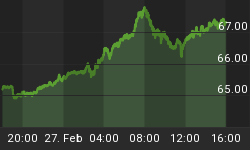Analyses of China's massive appetite for gold are everywhere lately. But the following chart, which appeared today in a GoldCore market update was especially striking because it compares 2013 demand with that of 2012 - which was a big year in its own right. Through August, China has imported 994 tons of gold through Hong Kong, versus 511 tons in the year-ago period. And that doesn't include the production of China's domestic gold mines (300 or so tons, all of which stays within the country) and whatever else finds its way in through other ports. Assume monthly imports for the rest of the year average 100 tons, add in domestic gold production, and China will have accumulated at least 1,700 tons of gold in one year.

To put this in perspective, Germany claims gold reserves of a bit more than 3,000 tons (though much of this is stored in the US and has probably been loaned out and replaced with a financial asset called a "gold lease" which is only as valuable as the big US money center banks are solvent). So in one year China will have accumulated gold equal to more than half the reserves of one of the West's financial and industrial powers.
Why? Well, they could simply be investing in something they expect to go up, much like the typical American gold/silver coin buyer of the past few years. Or - way more interesting and probably more likely - they could be planning to back their currency with gold and push the dollar to the sidelines. One hint that a gold-backed yuan is being contemplated came in early 2013 when Yao Yudong of the Chinese central bank's monetary policy committee called for a new Bretton Woods system. Bretton Woods was the post-World War II fixed-exchange-rate system in which one currency - the dollar - was convertible to gold, while other currencies were pegged to the dollar. A new Bretton Woods-style monetary system, designed when China has the world's only gold-backed currency, would presumably have the yuan at its center and the dollar, euro and yen as mere satellite currencies.
More recently, China's official press agency, Xinhua, published an article that calls for a "de-Americanized world" that includes a new reserve currency.
With the rest of the world annoyed by America's abuse of the limitless credit card that is an un-backed global reserve currency - especially the global surveillance state we've created with all that free money - it's not a surprise that lots of people would prefer a different system. And at the rate gold is flowing from West to East, it might not be long before the latter has the leverage to make it happen.
At which point we in the US would have to start living within our means. Since the difference between Washington's tax revenue and its present spending and future commitments, when calculated honestly, is about $6 trillion a year, or roughly one-third of U.S. GDP, the cutbacks required to bring its finances into balance would be a lot like what Greece is going through. Except that we'll still have a printing press. Get ready to make history...















